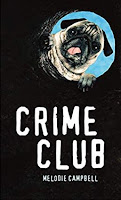Well, only a little bit is by me today. Instead, it's my pleasure to welcome friend, colleague, and fellow Canuck Judy Penz Sheluk to these pages. Judy hits on a topic particularly dear to my heart. I'll tell you why after her post.— Melodie
A Look Behind the Names
by Judy Penz Sheluk
If you follow me on social media, you'll know I'm the owner of Golden Retriever named Gibbs (after Leroy Jethro Gibbs of the long-running TV show NCIS). Gibbs, who will turn seven on October 15, is a good dog who lives up to the stubborn streak of his namesake and the Semper Fi (always faithful) motto of the marine corp.
Now, you might be asking what any of this has to do with Before There Were Skeletons, the latest book in my Marketville Mystery series, and I'm getting to that. You see, I've long been a supporter of Golden Rescue, a wonderful Canadian non-profit that connects Golden Retrievers of all ages in need of a home with folks hoping to adopt one. And like so many charitable organizations during the height of Covid, Golden Rescue's primary annual picnic and auction fundraiser was cancelled.
Enter Wanetta Doucette-Goodman, a tireless behind-the-scenes worker who organized more than one Facebook silent auction to raise those much-needed funds. When I saw the one in the Fall of 2020, I thought, I could donate a book copy or two, maybe even a "name the character" in my next book."
I floated the idea of a "name the character" by Wanetta and she loved it. In fact, she loved the idea so much that she became the winning bidder. But Wanetta is the giving sort. She didn't ask for a character to be named after her, but rather, her daughter-in-law, Kathleen "Kate" Goodman, nee Lindsay. She also sent me photos of Kate, and told me she had two older sisters, Kelly and Kristine.
I could have stuck to the original bargain - a character named kate Goodman--but what fun would that be? Besides, it's not as easy to come up with character names as you might think. And so, Before There Were Skeletons has several nods to Wanetta's winning bid:
Kathleen “Kate” Goodman: a twenty-eight-year-old woman who hires Callie to find her mother, who disappeared on Valentine’s Day 1995, following her shift at a local bar in Miakoda Falls. Veronica Celeste Goodman was 18 at the time, and by all reports, a devoted single mom who’d just signed a one-year lease.
Lindsay Doucette: Veronica’s older sister and Kate’s aunt. Lindsay raised Kate after Veronica disappeared, and, having been duped in the past, is not entirely on board with Callie’s investigation.
Wanetta Georgina Bulmer: Last seen in Miakoda Falls on January 17, 1995, Wanetta
was twenty years old and new to town.
Kelly Anne Acquolina: Last seen in Miakoda Falls on January 31, 1995, Kelly Anne was twenty at the time.
Kristine Paris: An important character with a secret past.
Of course, Callie’s first instinct upon reading the missing persons profiles of Veronica, Wanetta and Kelly Anne is that they are linked, though the police have never formerly reported that connection. Is she right? Ahh… you’ll have to read the book to find out. But at least now you know what’s behind the names.
Melodie here again: After I read this post, I talked to Judy and we both got a kick out of the fact that I had done something similar — that is, five years ago, donated a character name to a charity auction.
The charity was the Burlington Humane Society, and the winner was a pug called Wolfgang! (Yes, his good buddy/owner may have put him forward.) If you look on the cover of Crime Club, you will see Wolfgang in all his glory. He plays an important part in the investigation as well.
Check out Judy's latest mystery!

About Before There Were Skeletons
The last time anyone saw Veronica Goodman was the night of February 14, 1995, the only clue to her disappearance a silver heart-shaped pendant, found in the parking lot behind the bar where she worked. Twenty-seven years later, Veronica’s daughter, Kate, just a year old when her mother vanished, hires Past & Present Investigations to find out what happened that fateful night.
Calamity (Callie) Barnstable is drawn to the case, the similarities to her own mother’s disappearance on Valentine’s Day 1986 hauntingly familiar. A disappearance she thought she’d come to terms with. Until Veronica’s case, and five high school yearbooks, take her back in time…a time before there were skeletons.
· Universal Book Link: https://books2read.com/u/mqXVze
· About the Author:
A former journalist and magazine editor, Judy Penz Sheluk is the bestselling author of two mystery series: The Glass Dolphin Mysteries and the Marketville Mysteries. Her short crime fiction appears in several collections, including the Superior Shores Anthologies, which she also edited
Judy is a member of Sisters in Crime, International Thriller Writers, the Short Mystery Fiction Society, and Crime Writers of Canada, where she served as Chair on the Board of Directors. She lives in Northern Ontario on the shores of Lake Superior. Find her at judypenzsheluk.com.
















